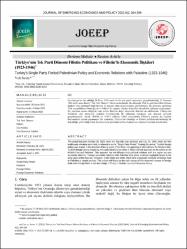| dc.contributor.author | Sırım, Veli | |
| dc.date.accessioned | 2022-05-11T14:33:27Z | |
| dc.date.available | 2022-05-11T14:33:27Z | |
| dc.date.issued | 2021 | |
| dc.identifier.issn | 2651-5318 | |
| dc.identifier.issn | 2651-5318 | |
| dc.identifier.uri | https://app.trdizin.gov.tr/makale/TkRRMU5EQXlNZz09 | |
| dc.identifier.uri | https://hdl.handle.net/20.500.11776/7738 | |
| dc.description.abstract | Cumhuriyet’in ilan edildiği 29 Ekim 1923 tarihi ile ilk çok partili seçimlerin gerçekleştirildiği 21 Temmuz 1946 tarihi arası dönem “Tek Parti Dönemi” olarak anılmaktadır. Bu dönemde Türk dış politikası Batı blokuna muhalif veya alternatif değil Batının bir parçası olma doğrultusunda şekillenmiştir. Bu anlayışla şekillenen Türk dış politikası, Ortadoğu’da ve Filistin’de yaşanan olaylara karşı Batı eksenli bir yaklaşım sergilemiştir. Bu yaklaşım sadece bölgeyle olan politik ilişkileri değil, ekonomik ilişkileri de etkilemiştir. Türkiye’nin Filistin’le olan ekonomik ilişkileri Cumhuriyetin ilk yıllarında neredeyse yok denecek seviyede gerçekleşmiştir. Ancak 1930’lu ve 1940’lı yıllarda, belirli periyodlarla Filistin’e yapılan dış ticarette beklenmedik artışlar yaşanmıştır. Bu makalede, Türkiye’nin Ortadoğu ve Filistin politikasında herhangi bir değişikliğe gidilmediği halde dış ticaretinde gözlemlenen bu artışların ana sebepleri üzerinde durulacaktır. | en_US |
| dc.description.abstract | The period between October 29, 1923, when the Republic was declared, and July 21, 1946, when the first multi-party elections were held, is referred to as the "Single Party Period". During this period, Turkish foreign policy was shaped in the direction of being a part of the West, not opposing or alternative to the Western bloc. Turkish foreign policy shaped by this understanding has taken a West-oriented approach to the events in the Middle East and Palestine. This approach has not affected only political relations with the region but also economic relations. Turkey's economic relations with Palestine took place at almost negligible levels in the early years of the Republic. However, in the 1930s and 1940s, there were unexpected increases in foreign trade to Palestine at certain periods. This article will focus on the main causes of this observed increase in foreign trade even though there is not any change in Turkey’s Middle East and Palestinian Policy. | en_US |
| dc.language.iso | tur | en_US |
| dc.rights | info:eu-repo/semantics/openAccess | en_US |
| dc.title | Türkiye'nin Tek Parti Dönemi Filistin Politikası ve Filistin'le Ekonomik İlişkileri (1923-1946) | en_US |
| dc.title.alternative | Turkey's Single Party Period Palestinian Policy and Economic Relations with Palestine (1923-1946) | en_US |
| dc.type | article | en_US |
| dc.relation.ispartof | Journal of emerging economies and policy (Online) | en_US |
| dc.department | Fakülteler, İktisadi ve İdari Bilimler Fakültesi, İktisat Bölümü | en_US |
| dc.identifier.volume | 6 | en_US |
| dc.identifier.issue | 1 | en_US |
| dc.identifier.startpage | 284 | en_US |
| dc.identifier.endpage | 294 | en_US |
| dc.institutionauthor | Sırım, Veli | |
| dc.identifier.trdizinid | TkRRMU5EQXlNZz09 | en_US |



















